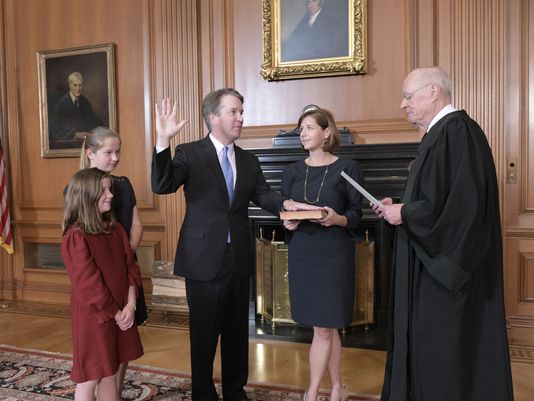Jay Familetti ’19

Photo Courtesy of USA Today
The recent appointment of Brett Kavanaugh to the Supreme Court continues to generate discussion in the nation generally as well as here in the EA community. Supreme Court Justice Brett Kavanaugh’s designation of “innocent” is not the product of what he did or what he did not do. It is simply the result of a sacred principle of the American judicial system: innocent until proven guilty.
Dr. Christine Blasey Ford, professor of Psychology at Palo Alto University, as everyone knows, accused Kavanaugh of sexual assault. Ford stated that over three decades ago at a house party in Montgomery County, Maryland, Kavanaugh threw her on a bed and covered her mouth as he fumbled to undress her. He was interrupted by a friend of his who jumped on top of them, and she wriggled free.
The hearing surrounding this incident created an increasingly partisan and ideologically divisive environment. After his Maura Murphy ‘96 lecture on October 26, Michael Smerconish, CNN and SiriusXM Radio Host, weighed in on the partisanship of our current nation stating that “It didn’t used to be this way, it doesn’t need to be this way, but its a direct reflection of this artificial political divide in our society where the politicians and the media are much more divided than the rest of us.”
Specifics only have value when specifics are proven and verified by witnesses or otherwise. Even though there is no proof this happened, many now believe there is a rapist on the Supreme Court. Ian Reape ‘20, says, “I think what happened to him was wrong and was only because of his political affiliations and his connection with Trump. I honestly do not know if Kavanaugh did what he was accused of, but people are forgetting that it is innocent until proven guilty in this country.” Reape’s point is what many who don’t buy Blasey Ford’s story allege. Ford can’t even remember the sequence of events leading up to and after the attack. Blasey Ford, interviewed in TIME Magazine’s “Trump’s Attack Against Christine Blasey Ford Mischaracterizes How Memory Works, Experts Say” offers an explanation as to why Ford cannot remember the events of the night of her alleged assault. She explains the scientific viewpoint on trauma-related memory, saying that neurotransmitters in the brain “code(s) memories into the hippocampus and so the trauma-related experience is locked there whereas other details kind of drift.”
Belief versus proof is the crux of this entire dilemma. In an incident that is over thirty years old, with little-proven evidence, the increasingly prevalent word-against-word battles of today’s time have fertile ground to take root. The hashtag #ibelieveher is a direct manifestation of the “he said…she said” conflict. Belief in whether or not Kavanaugh truly did pin down and try to undress Ford depends on who is asked.
There is an unfortunate alternative: Ford may have been entirely truthful but simply lacked the evidence to effectively prevent Kavanaugh from assuming his position. Coming forward with this information after such a long time makes perfect sense when considering the context: Ford wished to reveal Kavanaugh as an amoral man who should not serve on the Supreme Court when his nomination became known. The time between the assault and her coming forward, however, legally nullifies Kavanaugh as his alleged crime is outside of the statute of limitations.
Some make the argument that Brett Kavanaugh does not deserve to be on the Supreme Court because he is clearly lying and therefore perjured himself. Bing Quan ’19 states that, “Whether or not Kavanaugh was guilty of sexual misconduct or not, I personally do not believe that America should have a Supreme Court Justice that acts unprofessionally in a courtroom and lies about his past under oath.”
Clearly, many people across the country are more than willing to condemn Brett Kavanaugh based off of the words of one person and interviews that support that person’s claim, but when concerning issues such as alleged sexual assault that can entirely destroy the accused’s life, nothing matters besides cold, hard proof. Ultimately, allegations that did not go to the extent of rape nevertheless have the power to brand the accused as a rapist. To wholly rely on belief is quite simply disrespectful to all of the people in American history who were actually taken to court, tried, and unjustly convicted on the words of others. Brett Kavanaugh, a legally innocent man, is on the Supreme Court.